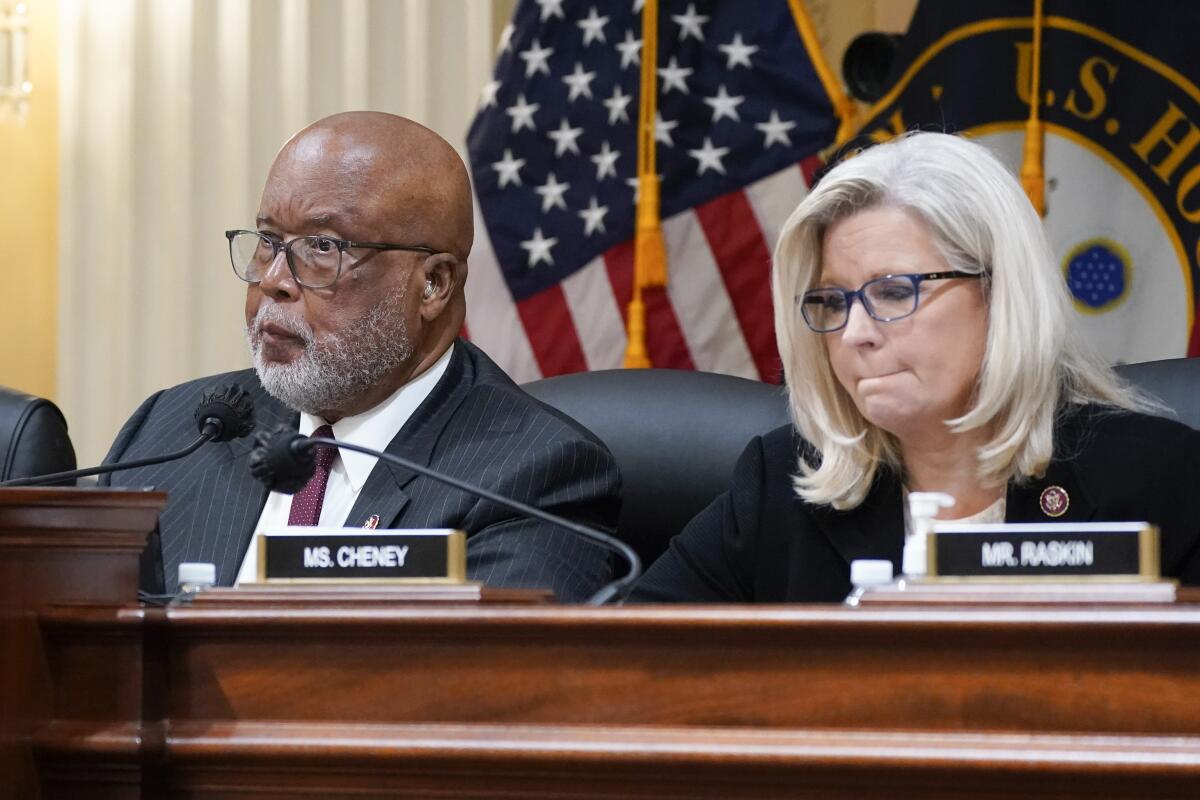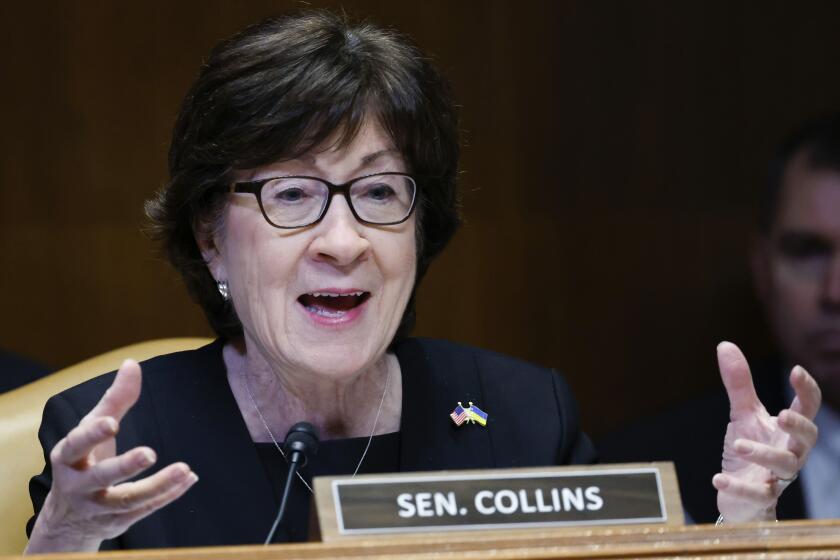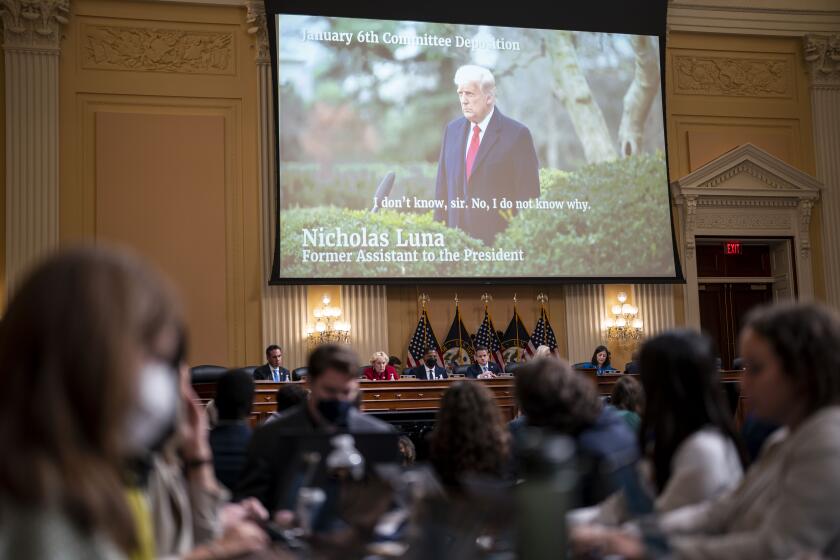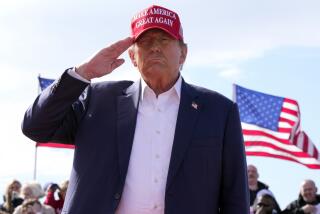The next Jan. 6 committee hearing is set. What have you missed?

After a long break and then a postponement caused by Hurricane Ian, the House Jan. 6 select committee is set to hold what may be its final hearing Thursday at 10 a.m. Pacific time. Committee Chair Bennie Thompson (D-Miss.) told reporters last week that the hearing will not have live witnesses — a first for the panel — but he added, “We still have significant information that we’ve not shown to the public that’s available to us.”
Committee members haven’t tipped their hands about the ground they plan to cover or the surprises they may have in store. But the political landscape has shifted significantly since their last hearing captured the nation’s attention in late July. Since then, former President Trump’s Florida home was searched by the FBI, evidence emerged that he’d squirreled away sensitive top-secret documents, and Trumpworld came under increased scrutiny from prosecutors in New York and Georgia.
In fact, so much has happened since the committee’s last session, you might have a hard time recalling all the ground the panel covered in June and July. To help get you back up to speed, here is a recap of the previous eight sessions.
Thursday, June 9: The committee led off with a graphic and emotional look back at the attack on the U.S. Capitol that occurred as lawmakers tried to count electoral votes. One key moment was a 10-minute video with previously unseen footage of protesters battering their way into the Capitol. Another was the testimony of Capitol Police Officer Caroline Edwards, who said she was “slipping in people’s blood” as she fought to defend the lawmakers inside.
Monday, June 13: The second hearing revealed evidence that Trump and his advisors spread the “Big Lie” even though they knew there was no widespread election fraud. Trump, the committee said, was informed multiple times by campaign staffers and Atty. Gen. William Barr that there was no proof that the election had been stolen.
Thursday, June 16: This hearing focused on the pressure that Trump and conservative California lawyer John Eastman exerted on Vice President Mike Pence to overturn the election by rejecting electoral votes from seven states Joe Biden won — even though they knew their actions were illegal. The panel heard from a top Pence aide, who said the vice president never believed he had the power to throw the election to Trump, as well as a conservative judge who helped Pence resist Trump’s demands.
A bipartisan group of senators has reached agreement on proposed changes to the Electoral Count Act in an attempt to prevent another Jan. 6 attack from occurring.
Tuesday, June 21: The committee heard testimony from the speaker of the Arizona House of Representatives and two election officials from Georgia, all Republicans, about the efforts by Trump and his lawyers to get them to reverse election results without the legal authority to do so. An election supervisor from Fulton County, Ga., also spoke emotionally about the harassment she, her mother and her grandmother endured after they were accused by Trump of election fraud — a claim he knew had been debunked.
Thursday, June 23: Three former top Justice Department officials in the Trump administration recounted the former president’s concerted efforts to have the department declare the election tainted and to push state legislatures to throw out the results. When they resisted, they said, the president was set to name another appointee, Jeffrey Clark, as the acting attorney general, only to back off when the department’s entire leadership threatened to resign. The day before the hearing, Clark’s home was raided by federal investigators.
Trump “wanted the Justice Department to help legitimize his lies, to baselessly call the election corrupt, to appoint a special counsel to investigate alleged election fraud,” Thompson said.
The House Jan. 6 select committee announces that its next hearing will be on Oct. 13 at 10 a.m. Pacific. It could be the last one.
Tuesday, June 28: In a surprise move, the committee brought former White House aide Cassidy Hutchinson to testify publicly while the House was in recess. Her main focus was on conversations she had with top administration officials in the White House’s West Wing leading up to and during the events of Jan. 6. Among other revelations, she testified about being told that Trump had waved off concerns about weapons in the crowd that day, that he’d wanted to go to the Capitol so badly that he’d tussled with a Secret Service officer in his vehicle, and that he didn’t think the rioters who were chanting “Hang Mike Pence” were doing anything wrong.
Trump has criticized her testimony on Truth Social, his fledgling social media network, calling her “Lyin’ Cassidy Hutchinson,” among other critiques.
Tuesday, July 12: The committee laid out how Trump’s call for a protest on Jan. 6 reverberated with his supporters and extremist groups, who interpreted it as a summons to stop Congress from affirming Biden’s victory in the electoral college. A former Twitter employee, whose recorded testimony was presented anonymously, said Trump seemed to be tweeting directly to extremist groups, and judging by the messages he saw, the witness said, he expected violence on Jan. 6.
The panel also heard from Jason Van Tatenhove, a former spokesman for the extremist Oath Keepers group, who said the day “was going to be an armed revolution.” And Stephen Ayres, who has pleaded guilty to entering the Capitol on Jan. 6, told the committee that he went there only because Trump urged his supporters to do so in his speech that day.
A series of congressional hearings about the Jan. 6, 2021, attack on the U.S. Capitol have been televised. Here’s what you need to know.
Thursday, July 21: This hearing focused on what Trump was seeing, hearing and doing on Jan. 6 in the hours after he urged a massive crowd of his followers on the Ellipse near the White House to march on the Capitol. Two former White House aides — Sarah Matthews, an ex-deputy press secretary, and Matthew Pottinger, a former deputy national security advisor — and a host of other witnesses offering taped testimony described how Trump ignored pleas from advisors, family members and Republicans in Congress to call off the rioters.
In fact, the witnesses said, Trump made matters worse by sending a tweet criticizing Pence as the vice president was being hustled away from protesters in the Capitol amid fears for his life. The president eventually put out a video praising his followers and urging them to go home, after Pence had demanded the military’s help to quell the riot.
Times staff writer Sarah D. Wire contributed to this report.
About The Times Utility Journalism Team
This article is from The Times’ Utility Journalism Team. Our mission is to be essential to the lives of Southern Californians by publishing information that solves problems, answers questions and helps with decision making. We serve audiences in and around Los Angeles — including current Times subscribers and diverse communities that haven’t historically had their needs met by our coverage.
How can we be useful to you and your community? Email utility (at) latimes.com or one of our journalists: Jon Healey, Ada Tseng, Jessica Roy and Karen Garcia.
More to Read
Get the L.A. Times Politics newsletter
Deeply reported insights into legislation, politics and policy from Sacramento, Washington and beyond. In your inbox three times per week.
You may occasionally receive promotional content from the Los Angeles Times.














